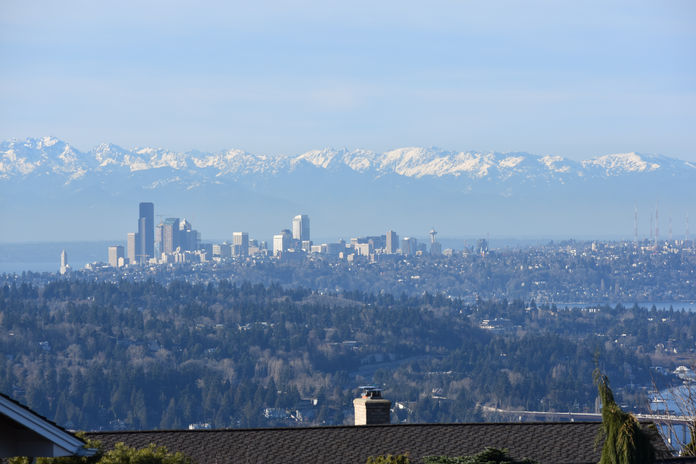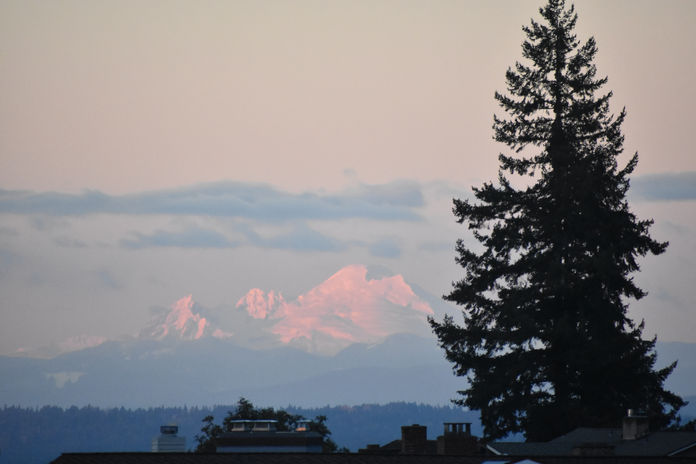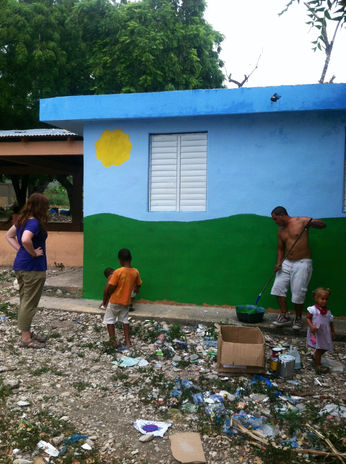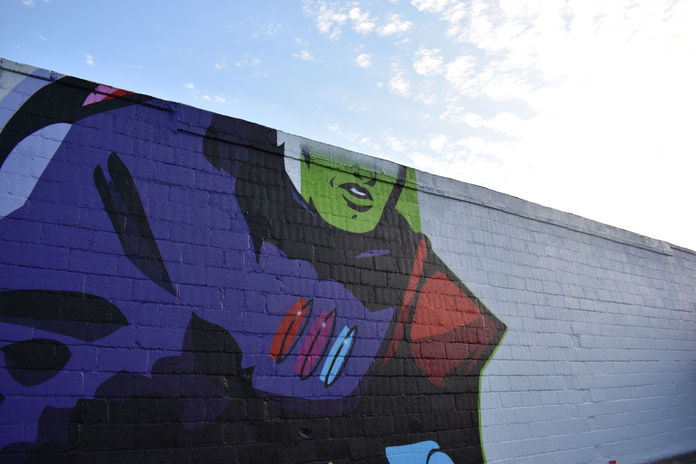Around the World
My World Map
Through 23 states, 21 countries and 5 continents, every moment has been one to remember. I've done a combination of volunteering, working and studying abroad around the world, including several longer trips. In this interactive map, you can see a bit of what I've done everywhere I've gone - just click on each icon. More detail is included below if you want to learn about my more personal experiences.
Bellevue, Washington
1998 - 2016: Born and raised in a suburb of Seattle, I will always call the Pacific Northwest my home. Give me mountains, give me parks, give me rain and I'll be happy forever! Not to mention my whole family lives there, so it's been hard to say goodbye. Most of my perspectives and experiences were shaped in Bellevue, so it was really different to live in Missouri for four years to study.
Travel: I mostly traveled around the U.S. during my childhood, plus some trips to Canada and the Caribbean. It wasn't until the Dominican Republic that I had my first significant international experience.
I got my first camera for my 19th birthday in 2017. At home I've taken lot's of photos, mostly while I was still learning how to use a camera. Take a look at some of my photos through my learning stages!
Neyba, Bahoruco, Dominican Republic
June - August 2014: When I was 16 years old, I lived with a host family in the Dominican Republic. I don't remember why I wanted to, but I have had an irrational need to travel since I was in the fourth grade (that's a whole other story). This was my first chance to try it out.
My Family: When I got there, it was the oddest night of my life. We drove to a small neighborhood called "La Colonia," about 15 minutes from the the nearest city, Neyba, which had a population of just over 50,000 people. Even though I had been speaking Spanish for five years, I was so out of my element. After we got off the bus, a group of students took me to my host mother, Leudis (Leu), who quietly brought us inside her three-room home which was about the size of my living room in Bellevue. There I met my host sisters, 8-year-old Violet and 1-year-old Frida, and my 14-year-old host brother Billy, who I would spend the majority of my time with over the next six weeks.

The moment I truly felt my host family was my own family: Leu had been off grocery shopping downtown, and Billy, Violet, the other volunteer and I were goofing off around the house. I think we were just playing games and having a good time. All of a sudden, we heard a motorcycle start to come up to the house, and Billy and Violet frantically jumped up and started mopping and cleaning the dishes. They were supposed to finish before their mom got home, and they hadn't even started. Luckily, it was a false alarm.
The whole moment was exactly the same as many I'd shared with my brothers back at home. Once we'd hear the garage door opening, we'd run around trying to get all our chores done, or pretending that we had been working on homework the whole time rather than goofing off. It was a fun reminder that family dynamics are the same everywhere you go, and a nice moment for me to find a home away from home.
My host mom, Leudis
The first week there, I couldn't understand hardly anything anyone was saying. I would reply to every question or statement with "sí" because I didn't know what else to say. Luckily, after getting used to the Dominican accent I was able to keep up a bit, and eventually I got to a point where I understood just about anything anyone said to me, and I could find a way to say what I wanted to say as well.
What I Did: I was drawn to the program because of the independence of it — instead of a large group of Americans dropping into a community and building a school that wasn't needed, only me and one other volunteer would join the two-block neighborhood, and we would organize a project based on what the community wanted to do. So I was disappointed when our organization didn't approve the community's project. The leaders we spoke with unanimously agreed to repaint houses that were rundown in order to improve the value of their neighborhood. A criteria for our project was that it had to benefit the whole community, not just individual families, so our organization recommended we paint the community center instead.
I also led daily camps for kids about youth leadership. We expected the kids to be around middle-school aged. Since we were in such a small community, most of the kids ended up being around ages 3 to 9, and honestly, we didn't really have the vocabulary to teach about youth leadership in Spanish.
Ultimately, I was incredibly young when I went on that journey. I made great relationships with my host family and others in La Colonia, and more importantly, I learned so much about the culture of those who live there. However, I was too inexperienced to really do much good while I was there, and as valuable as my experience was in better understanding the world, it makes me think harder about international work that I may want to do. As an international journalist, I frequently answer these questions about each project:
-
What am I going to accomplish?
-
How am I going to accomplish it independently?
-
Is this work welcome?
-
Am I the best person who can do this? Can someone from this country do this work better?
-
What am I bringing to the table?
This allows me to make sure that I am doing work that is worth it, and that I can be proud of.
I usually didn't have my phone with me while I was there, but when I did, I took a few photos (I didn't own a camera yet). Here's some of my favorites:
Columbia, Missouri
August 2016 - May 2020: I moved to Missouri to study at, in my opinion, the best journalism school in the world. I knew I wanted to be a journalist to report on underrepresented voices, so I figured, why not go to the best school for it? I was a bit nervous because I didn't know a single other person going to the University of Missouri, but it was definitely worth it. I have now found a community of friends and coworkers that I consider my family here. My mom was not happy my freshman year when I asked her, while eating Thanksgiving dinner, "when do I fly home?"
Political Science: I've always been interested in politics. I've known since high school that I would get a double major in political science. But, I had no idea what options for classes I would have. Since I would be spending so much time developing journalistic skills, I wanted to establish a base of knowledge in my interests to back that up, and make my work that much better. I took many classes in international relations, including Strategy and Warfare, Global Human Rights, Peacekeeping and Intervention and Environmental Conflict and Security, to name a few. It was refreshing to see that I really was passionate about the topics I had assumed I was interested in. Now, I am working on my Bachelor's thesis, which is about how political rhetoric against sanctuary counties influences the decision-making processes of law enforcement officials.
My Work: I've worked at a variety of different newsrooms while in Columbia. My first newsroom was at KOMU 8 News, a local NBC affiliate for mid-Missouri. I started out working there my first week of school as a production assistant, cutting video for the newscast and manning the teleprompter. I slowly worked up the ranks, first to digital producer, which allowed me to start writing breaking news for web and managing social media, and then as a news producer. My first week as a producer, the summer before my junior year at MU, we were so short staffed that I was scheduled to produce the 6 p.m., 9 p.m. and 10 p.m. newscasts every Saturday — with no executive producer, or any other supervisor for that matter. I certainly learned how to produce very quickly! Luckily I was working with a great team of reporters who were able to help me out when I was struggling. Just this semester, I was the executive producer for the morning show for the first time, which was a whirlwind. Sitting in the booth for two and a half hours while frantically writing more scripts and transferring video was definitely not the easiest (and not the cleanest) show I've done, but the professional anchors told me they were proud.
My sophomore year I worked at the Columbia Missourian, a city newspaper. There I worked as a general assignment reporter and a reporter on the community beat. I helped write a special edition of the paper, called "Boomtown," that was mostly profiles on Columbians over 50 who had taken new leases on their lives. Looking back on my work from there, I can see much to be improved upon, but that's how you learn!
After studying abroad for a while, I came back to Missouri and started working at Missouri Business Alert, an online publication that deals with entrepreneurial and business interests around the state. I began cultivating my multimedia skills more here, and was able to find the business angle of things I was passionate about, like the arts. My first big project was about a mural festival in Kansas City. I will be returning next semester to co-host and produce their Speaking Startup podcast, which looks into entrepreneurs, startups and small businesses. This opportunity has been exciting, because I didn't know much about business before I started, but I'm realizing how relevant it is to the work I want to do with human rights, social justice and immigration.
Cape Town, South Africa
May - June 2017: The first chance I could get, I left the country and went to South Africa for 3 weeks with a group of students from the University of Missouri. First, we spent two weeks in Cape Town working on individual projects documenting the history of apartheid in the region. It was my first real reporting project, so I chose to go with something I knew well - the arts. Using the Mayibuye Archives at the University of Western Cape, I researched the evolution of black theater in South Africa, from an expression of struggle, to the active desire for liberation, and eventually a tool used by the Black Consciousness Movement to unite black groups and raise black self-confidence and creativity.
I had the opportunity to interview a variety of members of Cape Town society, including Marlene le Roux, the first black and disabled woman to be the CEO of Artscape, a prominent arts organization in the city. We also interviewed former political prisoners, current government officials and student groups at UWC.
After two weeks in Cape Town, we headed out to the province Mpumalanga to visit Kruger National Park and go and wildlife safaris for a week.
Brussels, Belgium
January - April 2019: My spring semester of Junior year, I studied abroad in Brussels, something I had wanted to do since before I was accepted into Mizzou. I worked at International Crisis Group, a non-governmental organization specializing in conflict prevention and resolution. As my first step into the world of conflict, I helped with digital content management, uploading reports and creating social media content.
I also took several classes that taught me how to work with European audiences, both as a reporter and as an international citizen. During my free time, I traveled all around Europe, visiting the Netherlands, Luxembourg, the United Kingdom, France, Czechia, Hungary, Spain, Italy, Greece and Morocco.
New Delhi, India
May - August 2019: I ended up flying straight to India after my internship in Brussels to start a new internship at the Indian Express, a national English-language newspaper. My first day working there was election day, and we went to the headquarters of the BJP party, which ended up winning the Prime Minister a reelection. That was truly a crazy day. I vividly remember standing on a roof in 110+ degree heat, wearing jeans, and not minding one bit.
There I had the opportunity to work on the stories I had always wanted to work on. I had dreamed of one day being able to visit a refugee camp and telling the stories of immigrants. Within my first week, my editor sent me with another reporter to a Rohingya refugee settlement nearby to cover upcoming floods (their temporary homes were built on floodplains). Through that story I researched and became lead on a story following the lives of people living year round on floodplains, who have to relocate every year.
While working on this story, another reporter and I found out that people living on this government-owned land were being exploited and threatened by unknown people, demanding they hand over rent money. When we brought this to our editor's attention, he said, "Bad things happen all the time. There's nothing we can do about it." Unfortunately, there really was nothing I could do about it, on my own at least. I didn't know Delhi that well, I had no connections, and I didn't speak Hindi. I pushed the story a bit more, but my editor was focused on other things.
With extra time on my hands, I decided to visit another Indian Express reporter in Assam, a state in northeastern India. I shadowed her as we spoke with the family of a woman who had been detained during trials related to the National Register of Citizens. This was a list put out by the state government that listed every Indian citizen in the state. If you weren't on the list, you were at risk of losing your citizenship unless you could prove it in court. This woman had been born in India, but with a changed name from marriage and a typo on her voter ID card (an issue that was quite common in the area), she could not prove that her birth certificate was her, and she was arrested and sent to a detention center. A month after we spoke with her family, nearly 2 million people lost their citizenship.
The experiences I had in India gave me insight not only into the different perspectives people face the world with, but also into how things work in the U.S. From things as simple as fire codes to more complicated subjects like housing for the poor or international procedure, I noticed issues in India that I hadn't even thought about in the U.S., although they certainly exist. It made me excited to get back to reporting in the U.S., and make those connections.

























































